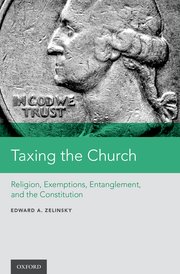Originally Published on forbes.com on March 25th, 2012
______________________________________
I suppose it is probably my fault that my quirky little tax blog has temporarily transformed into a First Amendment Forum. I’m still inclined to blame Phil Driscoll. The guy had a “ministry” that looks more like a record label and claimed nearly$200,000 in parsonage exclusion for his second home. That strikes me as being almost as ridiculous as Anietra Hamper deducting the thongs that she wears while reading the news or the fellow who started a not for profit to distrubite sperm to women who did not want to become pregnant the old fashioned way – his own sperm,exclusively. Only Driscoll won in Tax Court, although the IRS won on appeal.
Maybe I should blame Robert Baty. My interest in the consitutionality of Obamacare falls within my beat because the controversial mandate will be enforced as part of the Internal Revenue Code (Never mind that there is a question as to whether the required payment is a “tax”). Robert Baty connected the dots between the parsonage exclusion and the conscience exceptions to Obamacare. He also pointed out the existence of basketballministers, which allowed me to work in Jeremy Lin, which was all anybody was writing about for a while. Never mind, I’ll stop my whining. Besides, based on traffic more people are interested in this stuff than in what the Chief Counsel has to say about Crummey powers.
I may have hit the end of the road on these issues though because I think that I have found a pretty good answer, although few people will find it satifying. Edward A. Zelinsky‘s (a professor of law at the Yeshiva University, Benjamin Cardoza School of Law), recent research paper has a real jawbreaker for a title:
The debate about the parsonage exclusion focuses on separation of church and state. In some of the case law it is referred to as avoiding entanglement. Professor Zelinsky makes a really good case that when taxation impinges on church state relations, entanglement is inevitable. All you get to do is pick your poison:
In this setting, there are no disentangling alternatives. If religious entities and actors are taxed, they are subjected to the inherently intrusive relationship between the tax collector and the taxpayer. If religious entities and actors are not taxed, there are inevitable tensions policing the boundaries of exemption. The choice between borderline entanglement and enforcement entanglement is inherent in the relationship between the modern state’s tax system and contemporary religious institutions and their personnel.
In the case of the parsonage exclusion Congress has chosen to deal with the borderline problem. Professor Zelinsky argues that this is one of the constitutionally valid choices of dealing with an inevitable problem. He makes a strong argument, however, that while exempting cash housing allowances may be constituionally permissible, it is probably bad tax policy. The exemption as it relates to in-kind housing, though, is probably good tax policy.
Valuing in-kind benefits is often difficult. When a benefit is provided in-kind, the benefit itself generates no cash for the employee to pay the tax which would result from including the benefit in the employee’s gross income. In light of these valuation and liquidity concerns, it may be difficult for the IRS to enforce the income taxation of in-kind benefits.
There is some indication that when the parsonage exclusion was first passed in 1921, it was in response to the perception that the type of inquiry necessary to evaluate in-kind housing to clergy, that would qualify for exclusion under the convenience of the employer exception, would be overly intrusive. It was only in 1954, that the cash allowance option was added. As Professor Zelinsky notes, the tax policy argument is much weaker for that portion of Code Section 107:
There is no compelling argument for establishing tax parity among those ministers who receive in-kind housing and those who receive cash housing allowances as the Code creates no similar parity for nonclerical employees receiving taxable cash and nontaxable employer-provided lodging.
As a matter of tax policy, Section 107(2) is inadvisable since parsonage allowances, paid and received in cash, pose neither valuation nor liquidity challenges for taxpayers or the tax system.
As a matter of tax policy, Section 107(2) is inadvisable since parsonage allowances, paid and received in cash, pose neither valuation nor liquidity challenges for taxpayers or the tax system.
Personally, I am very concerned by the ill-effect that a sudden repeal of the cash option would have on small congregations and mostly low paid ministers. Rather than repeal, I think the thing to do would be to put a dollar cap on cash housing allowances and have the cap not indexed for inflation. That would allow a reasonable transition whle rooting out much of the abuse.
Professor Zelinsky further discusses how the consitutional arguments he makes extend into health care options. You will have to read his article for that. I’ve got to get back to taxes.You can follow me on twitter@peterreillycpa.































































































